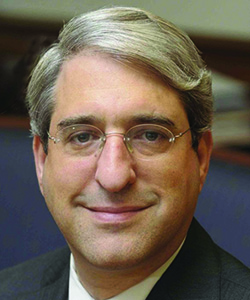Presidential Column
Academic Leadership

Nancy Eisenberg
Over the years, I have been surprised by the number of my friends or acquaintances in psychology who have become deans, provosts, and even university presidents. One of those individuals is Peter Salovey, whom I have known since I was a young faculty member and he was an undergraduate student working with David Rosenhan at Stanford University. I have watched his impressive career with interest and admiration for over 3 decades. Peter is now president of Yale University and, in this column, he provides some insight regarding the match of psychology training with work in higher administration.
-Nancy Eisenberg
In 2008, I was asked to serve as Yale’s provost by the university’s then-President Rick Levin. His pitch to me, more or less, was, “It takes two things to run a university — economics and psychology; I have the economics covered.”

Peter Salovey
As you may have guessed, Rick Levin is an economist. I am a social psychologist, although my doctorate is in clinical psychology. At the time, I thought Rick merely was trying to be persuasive. But a bit more than a year ago, I was asked to succeed him as Yale’s president, and my first act — while still president-elect — was to appoint my replacement as provost. I chose an economist, a game theorist, Ben Polak.
Given the financial challenges of leading a college or university, it is easy to imagine why economics helps. Whether trying to balance an operating budget; create a 10-year model for capital planning; advise on how to allocate an endowment’s investments or determine how much to spend from one; make decisions that involve trade-offs; or devise incentives that motivate faculty, staff, and students to support the institution’s mission, economics is certainly helpful.
But, as the global financial crisis demonstrated — and Nobel Prizes to Robert Shiller and Daniel Kahneman reflect — traditional economic models built on objective and rational calculations of benefits and costs only get us so far. And that is where psychology comes in.
On a daily basis, academic leaders and administrators confront behavior that is only partially explained by economics: Faculty worry about their compensation relative to the person in the office next door more than they worry about their compensation’s absolute amount; students overestimate the amount of drinking (and sex) engaged in by their fellow students and, accordingly, behave in risky ways; alumni feel great about the place when the football team is winning and despondent about it (and its president) when the team is not; staff members try to guess the intentions of faculty members they support and students they serve. Now, let me be clear: These examples do represent oversimplifications — even caricatures — and they do not reflect the greater sense of purpose felt by most members of a university community as, together, we pursue new knowledge, preserve existing knowledge, and transmit it to the next generation through teaching and learning. But they do contain kernels of truth, as it were, about day-to-day university life, and in those kernels are one well-documented psychological principle or another.
In my research life as a social psychologist, I study the role of emotions in providing information that undergirds social cognition and social behavior, as well as how individuals differ in processing this information. I also investigate how to develop messages about health and illness that are maximally persuasive in motivating real behavior change in ecologically complex circumstances. Meanwhile, I have maintained my license to practice clinical psychology, although I have not worked with psychotherapy clients since the days of my internship.
Every day, I draw on this background in serving as Yale’s president (and in working with our economist provost). The three major activities of a university president — develop and articulate the vision, hire the leadership team, raise the funds — require me to draw on everything I know or have studied about the psychology of persuasion, emotional intelligence, human motivation, and the like. Whether I am imagining the university in 1, 5, 10, or 100 years and setting appropriate goals; considering how to address students’ needs both in the classroom and in their social lives; building a more diverse faculty and student body; interviewing candidates for a deanship or department chair position; or speaking with an alumnus or parent about a potential gift to the university, my psychology background is evident in nearly every thought and idea. Though assuredly I am biased, I can think of no better background for this kind of work than that of a social psychologist with clinical training.
Faculty and graduate students in colleges and universities are often socialized to disdain opportunities to move into administrative or leadership positions. I know that I felt quite profoundly the calling to remain in the laboratory and classroom. But if the opportunity to move in such directions arises, psychologists should feel confident that we will be well served by the findings of our discipline and the habits of mind we develop as behavioral scientists and scientist–practitioners.




APS regularly opens certain online articles for discussion on our website. Effective February 2021, you must be a logged-in APS member to post comments. By posting a comment, you agree to our Community Guidelines and the display of your profile information, including your name and affiliation. Any opinions, findings, conclusions, or recommendations present in article comments are those of the writers and do not necessarily reflect the views of APS or the article’s author. For more information, please see our Community Guidelines.
Please login with your APS account to comment.